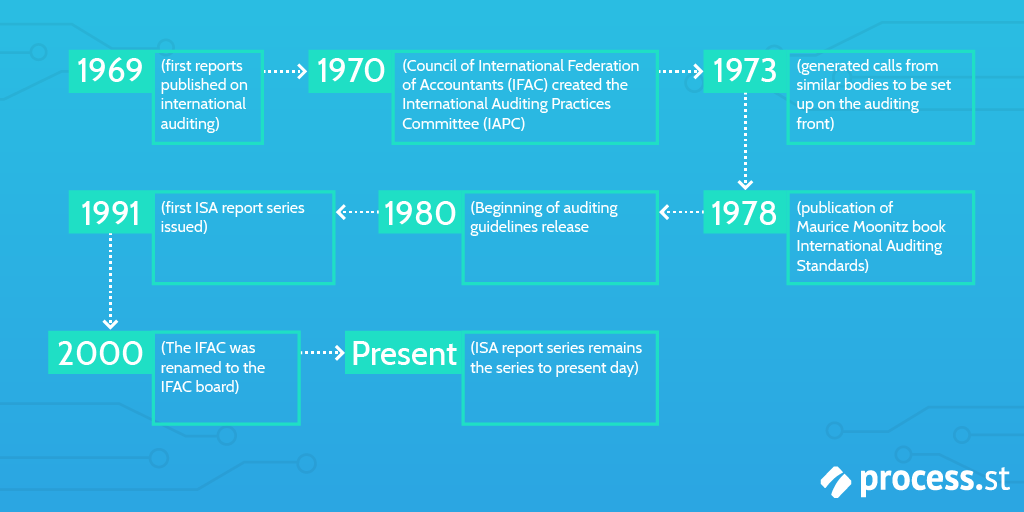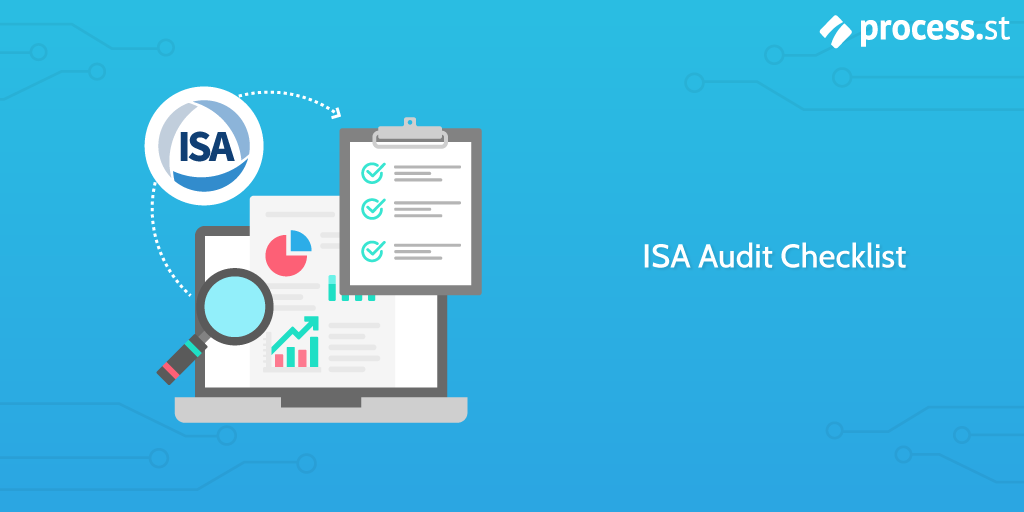
Job loss.
Insolvency.
Falling asset prices.
Complete market standstill.
Ring any bells?
You remember, as clearly as I do, the economic disaster of 2008. A global financial crisis; what could have caused such an economic catastrophe?
One hypothesis: Financial audit failures.
As concluded by the Financial Crises Inquiry Commission (FCIC), financial audit failures were found to have played a significant part in the financial crash.
Just like the FCIC, we at Process Street understand the importance of standards enforced by financial audit processes.
This article has been structured into two sections. The first section looks at the financial audit. The second section considers the International Standards on Auditing (ISA).
The ISA standards are a specific set of rules that operate globally.
Here’s a more thorough breakdown:
- The financial audit: What are financial audits?
- The financial audit: What are the International Standards on Auditing (ISA)?
- The financial audit: The benefits of International Standards on Auditing (ISA)
- How you can use Process Street to help with your external auditing processes
- ISA audit checklist
In the last section of this article, you will get your hands on our nifty ISA audit checklist for free.
You can use this template to conduct an internal check on your finances audits against the International Standards on Auditing. This checklist will save your organization a heap of time, worry, and money.
The financial audit: What are financial audits?
A financial audit evaluates an entity’s financial information, to ensure that it abides to specific criteria. The purpose of a financial audit is to provide reasonable assurance that financial statements are accurate, complete and devoid of fraud. Financial audit information is used by investors, regulators, directors, and managers.
You may have noticed in the definition above, I italicized the term reasonable assurance. I did this to make one thing clear: financial audits do not guarantee assurance to set criteria due to the prevalence of human error.
Human error plagues business operations and financial audit processes are not an exception. The key is to get the best assurance level possible, which means to minimize human error. But how would you do this?
Fortunately for you, we at Process Street have an answer: reduce human error by using checklists.
There is a stack of evidence supporting the notion that checklists significantly reduce human error. This hasn’t gone unnoticed.
For example, checklists are used in the medical industry. Checklists reduce human error in cardiac operating rooms and diagnostic procedures.
The Chernobyl disaster of 1986, the biggest nuclear catastrophe to date, was the result of six critical human failures. Checklists are now standard. They are used to mitigate human error in nuclear power plants.
The conclusion is clear: Increase the assurance of your financial statements by reducing human error. Do this by conducting financial audits using a checklist approach.
The financial audit: Internal financial audits and the benefits they bring to your business

There are many different audit types. An internal financial audit is one audit type that is entirely in your hands as a business owner. The internal audit acts as your in-house check. Internal audits continually evaluate your financial processes, documentation, and records.
Utilizing the internal audit can give you peace of mind, as you are reasonably assured your financial business operations are conducted as per strict international standards.
What are these international standards?
Well, standards are the rules. Specifically, these rules have been set and agreed upon by various international organizations and external regulatory bodies. Theses rules provide reasonable assurance that financial statements are accurate, complete and devoid of fraud.
If you read my previous article covering audit procedures, then you will understand why internal audits are important. Internal audits benefit your business, the benefits of which I have detailed below:
- Internal audit benefit 1: Measure practices and processes against proposed procedures to make corrections
- Internal audit benefit 2: Reduce the risk of data breaches and other cybersecurity concerns
- Internal audit benefit 3: Protect your internal network
- Internal audit benefit 4: Enable you to stay up to date on governmental regulations to maintain compliance
- Internal audit benefit 5: Monitor mobile technology security and efficiency
For more information on internal audits, see my previous article on Audit Procedures: A Quick Tour with 19 (Free) Templates.
Remember when we discussed why, in a given audit, only reasonable assurance is attainable due to human error? Discussing how you can remove this human error by utilizing a checklist approach for your financial audits?
Here’s one of our internal audit checklists, namely the financial audit checklist given below.
By using our financial audit checklist, you can be content knowing you are employing a perfect combination for your financial information to be on point.
- Internal audit: ✅
- Checklist format: ✅
Our Financial Audit Checklist has been designed with you in mind. Conduct your internal financial audit with maximal assurance.

Our financial audit checklist will act as your internal guide.
Let it aid you through the internal financial auditing process for your business. This checklist is free and ready for you to use right away.
Click here to access our financial audit checklist
In the next part of this article, we turn our attention to another audit type, namely, external audits.
The financial audit: External financial audits and the benefits they bring to your business ✒️
External financial audits are those that will provide certification of an organization’s financial statements. Certification is required by potential investors, lenders and all publicly-held businesses. An external financial audit examination will be conducted by an independent accountant.
External financial audits offer several benefits for business owners, as detailed by Chron.com:
- Provides validity: Objective opinion is provided on the business accounting processes. Insight from professional accountants is provided. This ensures the accuracy and validity of accounting information.
- Discovers errors: Errors that would otherwise impact financial trends and decision making processes.
- Limits legal and tax issues: Inaccurate or fraudulent accounting information can be identified. Incorrect accounting information that would otherwise increase the tax liability.
- Educates the business owner: The importance of business accounting information is communicated, with up-to-date material.
Like internal audits, external audits follow a set of standards. These standards will differ from country to country. In the U.S. Generally Accepted Accounting Principles (GAAP) act as the highest authority on accounting standards.
Looking on a more international scale, there is another set of financial audit guidelines to consider. Due to their broad applicability, this is where we now switch the focus of this article. The standards that I am referring to are the International Standards on Auditing (ISA).
The financial audit: What are the International Standards on Auditing (ISA)?
The International Standards on Auditing are internationally set guidelines issued by the International Federation of Accountants (IFAC). These standards act as a professional reference point to assess the financial information of a given entity.
The standards align financial auditing processes around the globe. A distinction must be made between these international standards and local/country-specific standards. Such a distinction begs the question: why do we need an international set of standards?
Surely, country-specific standards acting on a smaller scale would suffice?
In short, the answer is no.
You see, international standards for auditing processes bring benefits otherwise missed from more specific, localized auditing standards – keep reading to find out these benefits.
The ISA Audit series is the result of a long and difficult process, as you’ll learn by reading on. But the investment was made, and the end result was a landmark moment in financial auditing procedures. Today, ISA represents the leading international body for financial audit standards.
International standards on auditing timeline (a brief history) ️
 1969 is a key date, marking the publication of the reports dedicated to international auditing processes. The Accountants International Study Group were the initiators of this groundwork. This group compared the situation across Canada, the U.K., and the U.S.
1969 is a key date, marking the publication of the reports dedicated to international auditing processes. The Accountants International Study Group were the initiators of this groundwork. This group compared the situation across Canada, the U.K., and the U.S.
Four years later, through hard graft and a great deal of research, the International Standards Committee was established.
It wasn’t until 1980 however, that the International Auditing Guidelines were produced. Another 11 years is added on top of this before the issue of the first International Standards on Auditing (ISA). This ISA series of reports, devised in 1991, has remained that standard for financial auditing to this present day.
In the image above, that there is a significant reference to the book International Auditing Standards by Maurice Moonitz. Moonitz’s book ranks as a pinnacle moment in the history of ISA audits. The publication, grounded in comprehensive research, makes a strong case for the use of international standards.
So what benefits do international standards provide to financial auditing procedures?
The financial audit: The benefits of International Standards on Auditing (ISA) ️

We support continuing work to achieve convergence to a single set of high-quality accounting standards – The G20, G20 Leaders Declaration
There is near-universal support for international standards on financial auditing processes. The benefits brought by having a main, central body of high-quality global accounting standards are detailed below:
Benefit 1: International Standards on Auditing bring greater transparency
The international comparability and quality of audit information are enhanced. This means investors, lenders and other market participants can make more informed economic decisions.
Benefit 2: International Standards on Auditing bring greater accountability
Accountability is strengthened. The information gap between capital providers and those who have entrusted their money is reduced. Information is provided to hold management to account.
Benefit 3: International Standards on Auditing bring greater efficiency
Opportunities and risks are identified on a worldwide scale, improving capital allocation. You can think of the international standards for accounting as a single language. Hence advantages that come with using a single business language, also apply here. Communication is more effective and easier, this lowers international reporting costs.
Benefit 4 International Standards on Auditing remove cultural influences
Cultural inputs to financial auditing processes are removed for universal appeal. For example, the GAAP standards – as previously mentioned – are dictated by U.S. business firms reflecting the needs of American businesses. Such country-specific influences are removed with international standards.
Benefit 5: International Standards on Auditing eases financial auditing for multinational firms
Many organizations operate on a global scale. This makes it difficult for financial auditors to assess financial information operating across many countries. Different countries and regions have particular systems in place to be consulted. An international set of auditing standards removes differing systems. One single standard can be used to analyze financial information.
How you can use Process Street to help with external auditing processes
So far, in this article we have covered:
- The financial audit, with a definition of what a financial audit is
- The difference between an internal audit and an external audit, and the benefits the two types of audits can bring to your business
- Focused on the International Standards on Auditing. We have discussed the ISA standards history. We have learned the benefits international standards bring to your business
The aim, supported by many, is to have a universal set of financial auditing standards. The goal of a universal set of standards is to benefit organizations, lenders, and investors across the globe. If you would like to adopt these international auditing standards, then you have come to the right place.
You can use Process Street to help you implement International Standards on Auditing in your business today.
As a top business process management tool, Process Street is superpowered checklists. Use our checklists to make sure your compliance is in-line with relevant regulatory standards. In this instance, we are referring to the International Standards on Auditing.
How are our checklists superpowered?
Our checklists take the simple tick-box approach that has been spiced up to increase use-value. We have done this by adding the following features:
- Stop tasks to ensure task order
- Dynamic due dates, so no deadline is missed
- Conditional logic, creating a dynamic template that caters to your needs
- Role assignment, to ease task delegation within your team
- Approvals, allowing decision-makers to give the go-ahead (or rejection) on important items. In addition, necessary comments can be provided
This last feature, approvals, is game-changing. If you haven’t used it before, don’t fret. Just check out our Approvals: How to Streamline Decisions-Making in Process Street article. In this article, you will learn exactly what approvals are, why they are incredibly useful, and how to use them.
By using our checklists, you can increase the efficiency, productivity and effectiveness of your financial auditing processes. For those of you that are unfamiliar with Process Street and our offerings, check out our Monthly Webinar: An Introduction to Process Street below, for further insight.
ISA Audit Checklist
Internal audits act as your in-house check. You can use the internal audit to make sure you meet the standards set by an external audit provider. This means you are always prepared for an external audit.
As you know, checklists ensure assurance of your audit procedures to the standards set. You want your internal audit processes to have maximum assurance. Therefore, you need all your internal financial audits to utilize the checklist approach.
Well, with Process Street, you can do just that.
You can refer to the International Standards on Auditing guidelines. You can then transfer these guidelines into a checklist using Process Street.

To exemplify how you can do this, I have recreated the ISA 315 Identifying and assessing the risks of material misstatement through understanding the entity and its environment guidelines in our ISA audit checklist, embedded below for your consideration.
Click here to access the ISA audit checklist
This template is free and ready for you to use right away. You can transfer any of the ISA audit procedures into an ISA audit checklist, just like the one above, by creating your own template in Process Street.
Refer to our Help article Templates: Basics of creating and using templates. Alternatively, you can watch the below video, for more information on how you can create your own Process Street template for free.
You may have noticed I have been flitting between the two terms, checklists and templates. To iron out any confusion, I recommend that you watch the below video which explains the difference in the context of Process Street.
There are multiple International Standard on Auditing reports in the ISA series. For your reference, I have linked each pdf report below.
You can refer to the information in the International Standard on Auditing reports. Just as we have done for our ISA audit checklist (315), this information can be transferred into a checklist using Process Street.
International Standard on Auditing: Respective responsibilities
- ISA 200 Overall Objectives of the Independent Auditor and the Conduct of an Audit in Accordance with International Standards on Auditing
- ISA 210 Agreeing the Terms of Audit Engagements
- ISA 220 Quality Control for an Audit of Financial Statements
- ISA 230 Audit Documentation
- ISA 240 The Auditor’s Responsibilities Relating to Fraud in an Audit of Financial Statements
- ISA 250 Consideration of Laws and Regulations in an Audit of Financial Statements
- ISA 260 Communication with Those Charged with Governance
- ISA 265 Communicating Deficiencies in Internal Control to Those Charged with Governance and Management
International Standard on Auditing: Audit planning
- ISA 300 Planning an Audit of Financial Statements
- ISA 315 Identifying and assessing the risks of material misstatement through understanding the entity and its environment
- ISA 320 Materiality in planning and performing an audit
- ISA 330 The auditor’s responses to assessed risks
International Standard on Auditing: Internal control
- ISA 402 Audit Considerations Relating to an Entity Using a Service Organization
- ISA 450 Evaluation of Misstatements Identified during the Audit
International Standard on Auditing: Audit evidence
- ISA 500 Audit Evidence
- ISA 501 Audit Evidence – Additional Considerations for Specific Items
- ISA 505 External Confirmations
- ISA 510 Initial Engagements – Opening Balances
- ISA 520 Analytical Procedures
- ISA 530 Audit Sampling and Other Means of Testing
- ISA 540 Auditing Accounting Estimates, Including Fair Value Accounting Estimates, and Related Disclosures
- ISA 550 Related Parties
- ISA 560 Subsequent Events
- ISA 570 Going Concern
- ISA 580 Written Representations
International Standard on Auditing: Using work of other experts
- ISA 600 Special Considerations – Audits of Group Financial Statements (Including the Work of Component Auditors)
- ISA 610 Using the Work of Internal Auditors
- ISA 620 Using the Work of an Auditor’s Expert
International Standard on Auditing: Audit conclusions and audit report
- ISA 700 Forming an Opinion and Reporting on Financial Statements
- ISA 701 Communicating Key Audit Matters in the Independent Auditor’s Report
- ISA 705 Modifications to the Opinion in the Independent Auditor’s Report
- ISA 706 Emphasis of Matter Paragraphs and Other Matter Paragraphs in the Independent Auditor’s Report
- ISA 710 Comparative Information – Corresponding Figures and Comparative Financial Statements
- ISA 720 The Auditor’s Responsibilities Relating to Other Information in Documents Containing Audited Financial Statements
International Standard on Auditing: Audit conclusions and audit report
- ISA 800 Special Considerations – Audits of Financial Statements Prepared in Accordance with Special Purpose Frameworks
- ISA 805 Special Considerations – Audits of Financial Statements Prepared in Accordance with Special Purpose Frameworks
- ISA 810 Engagement to Report on Summary Financial Statements
More Process Street resources to help you with your audit checks
For your reference, I have detailed more Process Street resources below, that can help you with your internal audit checks:
- Financial Audit Checklist
- Environmental Accounting Internal Audit
- Environmental Management Self Audit Checklist
- Management Systems Audit Checklist
- ISO 9001 and ISO 14001 Integrated Management System (IMS) Checklist
- ISO 9001:2015 Internal Audit Checklist for Quality Management Systems
- PPC Audit Checklist
- Google Analytics Audit
- Technical SEO Audit
- UX Audit
- ISO 27001 Information Security Management System (ISO27K ISMS) Audit Checklist
- SQL Server Audit Checklist
- Firewall Audit Checklist
- Network SecurityAudit Checklist
- Occupational Health and Safety (OHS) Audit Checklist
- Diversity Management Monthly Audit
- Hotel Sustainability Audit
- Laboratory Safety Procedure Audit
- Retail Store Audit Checklist
Need further help with your finances? I have detailed our checklists below to help you with your business finances:
- Accounting Onboarding Procedures
- Accounts Payable Process
- Account Receivable Process
- Annual Financial Report Template
- Balance Sheet Preparation Checklist
- Bank Reconciliation Template
- Budget Preparation Checklist
- Budget Process
- Business Tax Preparation Checklist
- Cash Flow Report
- Cash Management Process
- Client Onboarding for Financial Planners
- Creating an Invoice
- Expense Management Process
- Financial Management For New Projects
- Financial Plan Template
- Financial Planning Process
- How to Start a Corporation Checklist
- Income (Profit and Loss) Statement Process
- Individual Tax Preparation Checklist
- Investor Pitch
- Know Your Customer Checklist
- PCI Compliance Checklist
- Private Equity Due Diligence Checklist
- Procurement Guidelines and Checklist
- Purchase of a Business
- Purchase Order Workflow Template
Use Process Street for your financial audit processes and install International Standards of Auditing
In this article, we have:
- Defined what a financial audit is
- Considered the benefits a financial audit can bring to your business.
- Deliberated the difference between an external and internal audit
- Outlined the benefits external audits bring to your business
- Defined what the International Standards for Auditing (ISA) are and explained why they are needed
- Introduced Process Street’s ISA audit checklist. We have explained how you can use Process Street to implement ISA standards
Whether you refer to country-specific or international financial standards, the aims are similar. These standards are set to provide economic order and control. Failure to abide can have damaging consequences, as exemplified by the 2008 financial crisis.
It is therefore important that you take both time and energy to enforce financial checks within your business. You can do this by conducting an internal audit. Abiding by international standards will help enforce a global common language that standardizes financial information. Having a consistent set of standards for financial audits can bring many benefits to the business world.
How do you conduct your internal financial audit checks? Do you have any questions about financial audits, that I have not covered in this article? Please comment in the section below, who knows, you may even get featured in an upcoming article.







 Workflows
Workflows Projects
Projects Data Sets
Data Sets Forms
Forms Pages
Pages Automations
Automations Analytics
Analytics Apps
Apps Integrations
Integrations
 Property management
Property management
 Human resources
Human resources
 Customer management
Customer management
 Information technology
Information technology



Jane Courtnell
Hi there, I am a Junior Content Writer at Process Street. I graduated in Biology, specializing in Environmental Science at Imperial College London. During my degree, I developed an enthusiasm for writing to communicate environmental issues. I continued my studies at Imperial College's Business School, and with this, my writing progressed looking at sustainability in a business sense. When I am not writing I enjoy being in the mountains, running and rock climbing. Follow me at @JaneCourtnell.